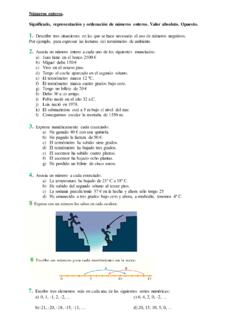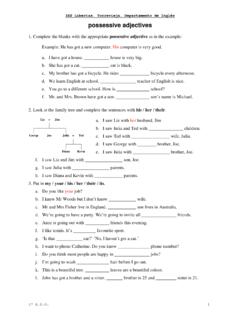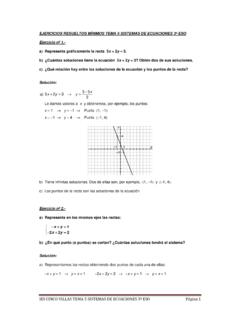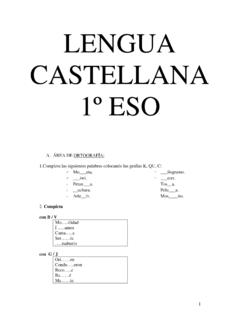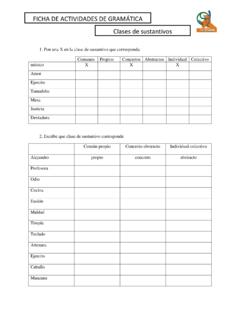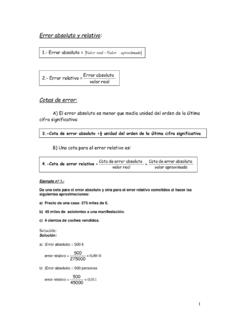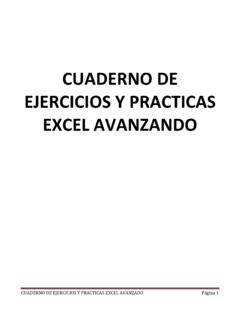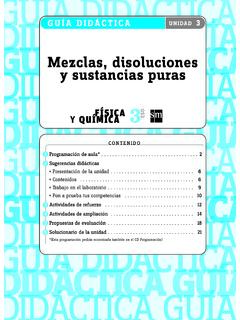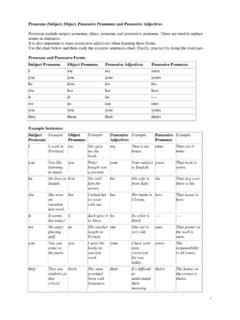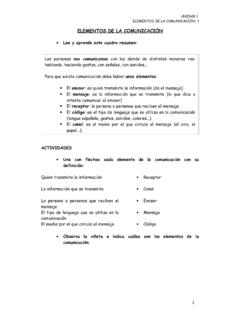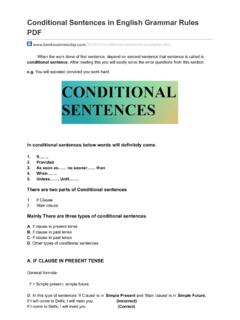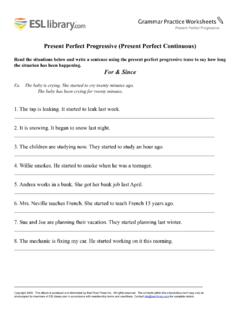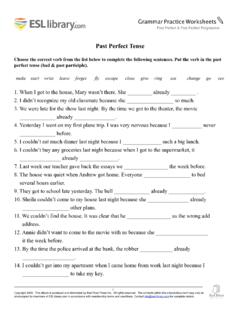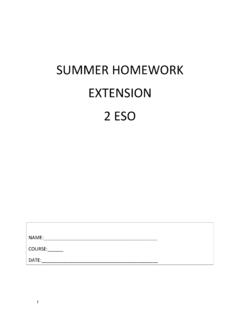Transcription of REFUERZO ACTIVIDADES DE RECUPERACIÓN Y CUADERNO DE
1 2 ESO 1 CUADERNO DE ACTIVIDADES DE RECUPERACI N Y REFUERZO 2 ESO NAME .. GRUPO 2 ESO 2 INSTRUCCIONES PARA COMPLETAR ESTE CUADERNO DE ACTIVIDADES DE RECUPERACI N Y REFUERZO 1. Antes de comenzar a realizar las ACTIVIDADES , estudia el vocabulario y la gram tica de la unidad correspondiente, tanto del Student s Book como del Workbook. 2. Una vez hayas aprendido el vocabulario/gram tica de la primera unidad, completa los ejercicios correspondientes. 3. Corrige en rojo los errores cometidos con la ayuda de la hoja de respuestas (answer key) que aparece al final del cuadernillo. 4. Se VALORAR positivamente la autocorrecci n de los ejercicios. 5. Repite este mismo proceso unidad por unidad. 6. Una vez terminadas todas las unidades, tendr s que realizar un ejercicio de expresi n escrita (writing) que adjuntar s en hoja aparte.
2 ESTRUCTURA DE LA PRUEBA EXTRAORDINARIA DE SEPTIEMBRE 1. Listening: 10% 2. Reading Comprehension: 20% 3. Ejercicios de gram tica: 30% 4. Ejercicios de vocabulario: 10% 5. Writing: 20% 6. ACTIVIDADES de recuperaci n/ REFUERZO y evoluci n a lo largo del curso: 10% 2 ESO 3 UNIT 1 1. Read the text about English lessons on mobile phones. ENGLISH LESSONS FOR EVERYONE People study English all over the world. They need English for work, to travel around the world and to find information, but in many countries, people don t know English very well. In Bangladesh, for example, many people can t learn the language because they haven t got money for lessons. Now, for people in Bangladesh, there is a solution to this problem. They can learn English on their mobile phones! Bangladesh is the first country in the world to use mobile phones for learning English. Over 50 million people in the country have got mobile phones.
3 They usually use their phones to chat with friends or send text messages. Now, they can learn English with Janala, the English language programme. Janala means window . This is a perfect name for these lessons because they open a window to the world. In the first three months, Janala gave more than one million English lessons. The lessons are very popular in Bangladesh now. The mobile phone companies are giving special low prices, so the lessons don t cost much money. Also, with Janala, people can study anywhere in the street, in shops, on the bus or at home. 2. Complete the sentences according to the text. 1. Many people in Bangladesh don t know English because .. 2. People in Bangladesh can now .. 3. Janala is popular because .. and .. 3. Complete the questions with the verbs in brackets. Use the present simple . 1. Why .. people .. (need) English? 2. What .. people in Bangladesh usually .. (use) their mobile phones for?
4 3. What .. the word Janala .. (mean)? 4. Why .. they .. (call) the programme Janala? 4. Answer the questions in Exercise 3 according to the text. 1.. 2.. 3.. 4.. 2 ESO 4 VOCABULARY do Jane and Marian do in their free time? Complete the texts with the activities below. Then look at the pictures and write the name of the correct girl. go dancing practises the piano chat with friends browses the web rides a bike goes to parties plays the guitar send text messages plays volleyball go ice skating In the morning, Jane always to read the news. Every afternoon, Jane for an hour. She loves music and she s got a new guitar. She also likes to on the phone in the afternoon. In the evening, she always does her homework. At the weekend, Jane often at friends houses. She doesn t usually write e-mails. She prefers to on her mobile phone. Marian s parents haven t got a car, so she to school.
5 She loves sport! She at school every day. In the winter, she also likes to . Once a week she s got music lessons. She for an hour every day. At the weekend, she likes to at the disco. GRAMMAR 1 .Write questions with the words below. Use the present simple . Then answer the questions. 1. when / you / get up / in the morning .. 2. you / study / English / every day .. 3. your teacher / give / homework / every lesson .. 4. what / you / do / after school .. 5. where / your best friend / live .. browses the web 2 ESO 5 UNIT 2 READING the e-mail from Kevin to his uncle. Hi Uncle Dave, I m writing to you from New York. Jim and I arrived here two days ago. New York is an amazing city! There are so many museums, caf s, department stores and markets. There are people everywhere. We are staying in a small hotel near Central Park. I know many cities have got parks in them, but Central Park is enormous.
6 It has got lakes, a zoo and beautiful gardens, and in the winter there are two ice rinks. I m sending you a picture of Jim and me in Central Park. In the picture, we re riding horses. We want to go to the top of the Empire State Building. There are great views of the city from the observation deck on the 86th floor. Once a year, there s a famous race up the Empire State Building. Over 100 participants run up a total of 1,576 steps. Do you want to try it? Jim and I also want to go to Madame Tussauds Wax Museum because we can hang out with our favourite stars: Beyonc , Leonardo DiCaprio and Johnny Depp. Jim wants me to take photos of him with Miley Cyrus. They ve got an American Idol studio there, too, and I want to sing for Simon Cowell. He was my favourite judge on the popular US TV programme. I m having a great time. See you soon. Kevin 2. Write questions with the words below about Kevin s visit. Use the present simple or present continuous .
7 Then answer the questions. 1. Kevin / visit / his uncle / right now .. 2. what / he / send / with his e-mail .. 3. why / he / want / to go to the Empire State Building .. 4. how often / people / run / the race .. 5. what / people / do / in the famous race .. 2 ESO 6 VOCABULARY: Complete the sentences. 1. We are at the a .. There are amazing fish here. 2. My father likes to meet his friends at the p .. for a drink. 3. My mother buys fruit and vegetables at the local m .. 4. I want to see the lions at the z .. 5. You buy medicine at the c .. 6. On holiday, people often sleep in a h .. 7. You can buy many different things at a d .. s .. GRAMMAR 1. Complete the sentences with the verbs in brackets. Use the present continuous . 1. The football player .. (run) with the ball. 2. The children .. (not watch) TV right now. They .. (take) a nap. 3. Amanda .. (wait) in a queue with her friends at the moment.
8 4. We .. (not have) a meal at the caf . We .. (drink) lemonade. 5. I .. (not play) computer games now. I .. (write) an e-mail. 6. Phil .. (not ride) his bike to the supermarket right now. 2. Write questions with the words below. Use the present continuous . 1. you / watch / TV / right now .. 2. what / Dan / do / at the moment .. 3. why / you / order / a pizza .. 4. it / rain / outside / now .. 5. where / you and your father / go .. 3. Complete the answers with the verbs in brackets. Use the present continuous . Then match the answers to the questions in Exercise 4.. a. No, it isn t. The sun .. (shine).. b. Because we .. (have) pizza for dinner.. c. He .. (take) a photo of our family.. d. No, I m not. I .. (practise) the piano at the moment.. e. We .. (walk) to the zoo now. q u a r i u m is shining 4 2 ESO 7 UNIT 3 the article about marriage and dating. IS MARRIAGE CHANGING?
9 Forty years ago, most people got married in their early twenties. But today, people often wait until they are older to get married. What caused this change? Read the information about dating and marriage and find out. In the past, men usually had better jobs than women. Many women got married early, had children and stayed at home. Today, many young women study at university and become professionals. They can find better jobs than women could get in the past. Because of this, many women want to work. They don t want to stay at home. They have also got more money to spend on travel, hobbies and interests outside the home. Dating is different now, too. Forty years ago, young people didn t have computers or mobile phones to talk to their friends. They went out more in the evenings. There was always a party or a place to go dancing, so it was easier to meet people. People often fell in love and got married at a very young age.
10 But today, Internet dating websites have become popular ways to meet people. These sites can often match people s interests and personalities to help them find husbands or wives. Some men and women chat for months before they actually meet. On the Internet, people don t usually fall in love right away and they can choose their future husbands and wives more carefully. Are these changes good? Well, according to some studies in the USA and in England, there aren t as many divorces in recent years. So, some people think these changes are good. What do you think? 2. Complete the sentences about life in the past according to the text. Use the affirmative or negative form of There was or There were. 1.. more young women at home. 2.. a place to go dancing. 3.. many women with professions. 4.. many parties in the evenings. 5.. any Internet. 3. Write questions with the words below. Use the Past simple . Then answer the questions.
